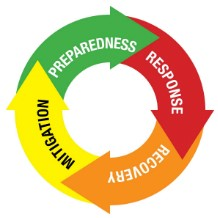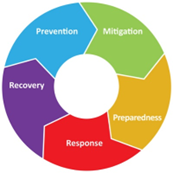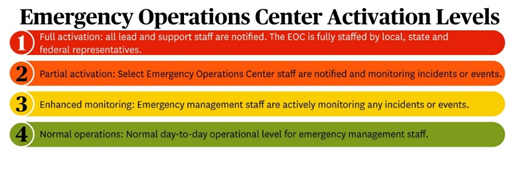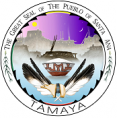Emergency Management
Mission Statement
To support a comprehensive and integrated system of planning and preparation to support the preservation of life, mitigate adverse impacts, prevent injuries, protect property and preserve the Pueblo of Santa Ana’s community, staff, visitors and guests and its invaluable cultural and natural resources in the event of a major emergency or disaster through preparedness and prevention activities.
What is Emergency Management?
Emergency Management protects the community by coordinating and integrating all activities necessary to build, sustain, and improve the capability to mitigate against, prepare for, respond to, and recover from threatened or actual natural disasters, acts of terrorism, or other man-made disasters. Emergency management is a never-ending cycle of mitigation, preparedness, response, recovery and prevention. The cycle requires wide-ranging management and coordination to ensure that all Tribal departments, staff/personnel, assets, and resources work together efficiently and effectively to protect the health, safety, and the welfare of all Tribal Members, as well as visitors, enterprise stakeholders and the communities in which they all live, work, and play. The PSA Office of Emergency Management (OEM) is committed to achieving its mission, thereby creating a more disaster resilient Pueblo of Santa Ana.

The PSA Office of Emergency Management (OEM) was created in 2020 with the goal of protecting the Community from All Hazards by coordinating and integrating all actions necessary to build, sustain, and improve the capability to mitigate, prepare for, respond to, ensure continuity of operations of Tribal government and recover from threatened or actual natural disasters, acts of terrorism, or other man-made disasters.
The PSA Office of Emergency Management’s (OEM) goals align themselves with the five core mission areas of the National Preparedness Goal: mitigation, preparedness, response, recovery and prevention. The OEM collaborates neighboring agencies, state and federal including agencies across the county and the nation to share plans, explore best practices and develop collaborative relationships to ensure the most effective and efficient response and recovery efforts.

What is an EOC?
…An EOC is a central command and control system responsible for carrying out the principles of emergency preparedness and emergency management, or disaster management at a strategic level during an emergency, and ensuring the continuity of operation of a company, political subdivision, or other organization. …FEMA
During an incident, emergency or disaster the OEM is responsible for coordination and support of response, including the activation of an Emergency Operation Center (EOC), if necessary.
Establishing and training a cadre of EOC members inclusive of Tribal leadership and administration leadership who are trained in section and position responsibilities and use of the Incident Command System (ICS), National Incident Management System (NIMS) and Standardized Emergency Management System (SEMS)

Other responsibilities of the Office of Emergency Management:
- Develop and maintain an approved Emergency Operations Plan (EOP) and associated annexes.
- Assisting tribal departments to develop department emergency plans which address how they will continue to perform both their non-deferrable missions and duties during disasters – Continuing Operations Plans (COOP)
- Assisting tribal departments with development of facility emergency action plans for physical facilities
- Plan and conduct Emergency drills and exercises which provide the most effective means of learning skills related to emergency preparedness and response.
- Working with outside agencies in collaborative efforts to maximize resources needed to respond and recover from major disasters.
- Supporting and advising the Tribal Administration (Governors), Tribal Council members, Department Heads other tribal Staff and stakeholders in matters pertaining to their role as elected officials, employees and Disaster Service Workers (DSW) during emergencies and disasters.
- Conducting community education outreach for all hazards through public venues, various social media forums and public presentations
- Re-establishing and maintaining PSA Community Emergency Response Team (CERT) program across the Pueblo and inclusive of the Pueblo’s business enterprise partners including coordinating efforts with local jurisdictions for unified training and response efforts.
As the Emergency Managers for the Pueblo – these are our guiding Principles:
Emergency Management must be:
- Comprehensive: Consider and calculate all hazards, all threats, all phases, all stakeholders and all impacts relevant to disasters and the impacts to the Whole Community
- Progressive: Anticipate future disasters and take preventive and preparatory measures to build disaster-resistant and disaster-resilient communities.
- Inclusive: Working with the elderly, Vulnerable/ At-Risk and individuals with access and functional needs (Disabilities) to ensure that all disaster/emergency planning efforts include and serve all community members.
- Risk-driven: Utilize sound risk management principles (hazard identification, risk analysis, and impact analysis) in assigning priorities and resources.
- Integrated: emergency managers ensure unity of effort among all levels of government and all elements of the community.
- Collaborative: Generate and sustain broad and sincere relationships among individuals and organizations to encourage trust, advocate a team atmosphere, build consensus, and facilitate communication.
- Coordinated: Synchronize the activities of all relevant stakeholders to achieve a common purpose.
- Flexible: emergency managers use creative and innovative approaches in solving disaster challenges.
- Professional: Value and practice a science and knowledge-based approach based on education, training, experience, ethical practice, public stewardship and continuous improvement.
Contact Information
For more information about the Pueblo of Santa Ana Emergency Management Program please contact:
Loren De Azevedo, Emergency Manager
Office: (505) 771-6397
Loren.DeAzevedo@Santaana-nsn.gov
Jerry Lazzari, Emergency Management Specialist
Office: (505) 771-6397
Jerry.Lazzari@Santaana-nsn.gov
.
Contact Emergency Management
505-771-6397
Office Hours: 8:00 A.M. - 4:30 P.M.
